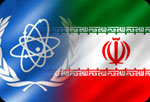 New York Times – Editorial: Iran continues to stonewall about its illicit nuclear activities. The International Atomic Energy Agency isn’t falling for it. Nobody should.
New York Times – Editorial: Iran continues to stonewall about its illicit nuclear activities. The International Atomic Energy Agency isn’t falling for it. Nobody should.
The New York Times
Editorial
 Iran continues to stonewall about its illicit nuclear activities. The International Atomic Energy Agency isn’t falling for it. Nobody should.
Iran continues to stonewall about its illicit nuclear activities. The International Atomic Energy Agency isn’t falling for it. Nobody should.
The agency’s latest report is chilling. While Tehran claims that its program has solely peaceful ends, it lists seven activities with potential “military dimensions.” That includes “activities related to the development of a nuclear payload for a missile”; new evidence that Iran has worked on a highly sophisticated nuclear triggering technology; and research on missile warhead designs — namely “studies involving the removal of the conventional high explosive payload from the warhead of the Shahab 3 missile and replacing it with a spherical nuclear payload.”
After the Iraq debacle, all claims must be examined closely. The I.A.E.A. has a strong record — in the run-up to the war it insisted there was no evidence that Iraq had a nuclear weapons program — and no ax to grind. There are still more questions to be answered.
American intelligence agencies, rightly chastened by their failure in Iraq, concluded in 2007 that Tehran had halted the weapons portion of its nuclear program four years earlier. United States officials now say that Iran’s massive “Manhattan Project” ended then but that many of the same scientists are still engaged in weapons-related pursuits. Meanwhile, Yukiya Amano, the head of the I.A.E.A., said in a news conference last week that “the activities in Iran related to the possible military dimension seem to have been continued until quite recently.” More explanation is needed.
Tehran insists the agency’s allegations are fabricated. At the same time, it is refusing to answer the inspectors’ questions about possible work on weapons designs and is blocking their access to sites, equipment and documents. Five years after the United Nations Security Council ordered it to halt uranium enrichment, Iran still has thousands of centrifuges spinning at its Natanz plant.
We don’t know if any mixture of sanctions and incentives will change that behavior. We are certain that without more pressure Tehran will keep pushing its program forward. The major powers’ last attempt at negotiations, in January, hit a wall, but Washington and its allies should keep looking for diplomatic openings. The fourth round of United Nations sanctions, imposed a year ago, is starting to bite, reducing Iran’s access to foreign capital, trade and investments. But implementation is still lagging.
The European Union finally moved last month to rein in the Iranian-owned bank in Germany, the European-Iranian Trade Bank, which is accused of facilitating billions of dollars of transactions for blacklisted Iranian companies. China has yet to sufficiently crack down on the Chinese firms that still do business with Iran’s sanctioned entities. Turkey, India and the United Arab Emirates, a major hub for Iranian commerce, are still too cozy with Tehran.
Iran has not wasted the intervening year and is always looking for signs of weakness. The United States and its allies need to tighten the current round of sanctions and start working on another Security Council resolution with even tougher sanctions.
If there is any good news in the I.A.E.A. report, it appears that Iran’s enrichment program is not advancing as fast as many feared — the result of the Stuxnet computer virus and sanctions that make it harder for Tehran to import needed materials from overseas. That has not blunted its ambitions. The Iranians said on Wednesday that they plan to triple production of the most concentrated nuclear fuel — the kind that could get them closer to a bomb.


